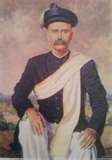Gopal Ganesh Agarkar
| Gopal Ganesh Agarkar | |
|---|---|

Gopal Ganesh Agarkar
|
|
| Born | 14 July 1856 Tembhu, Dist. Satara, Maharashtra, India |
| Died | Script error: The function "death_date_and_age" does not exist. [Pune], India |
| Organization | Deccan Education Society |
Gopal Ganesh Agarkar (14 July 1856 – 17 June 1895) (Marathi : गोपाळ गणेश आगरकर) was a Chitpavan Brahmin social reformer, educationist, thinker from Maharashtra, India during the British rule. A close associate of Lokamanya Bal Gangadhar Tilak, he was a co-founder of the renowned educational institutes like the New English School, the Deccan Education Society and Fergusson College along with Lokamanya Tilak, Vishnushastri Chiplunkar, Mahadev Ballal Namjoshi, V. S. Apte, V. B. Kelkar, M. S. Gole and N. K. Dharap. He was the first editor of the weekly Kesari and founder and editor of periodical Sudhaarak. He was the second Principal of Fergusson College and served that post from August-1892 till his last breath.
Throughout his short life of just about 39 years, he exemplified impeccably high moral character, utter determination to attain one's goals, sacrifice, great courage and a total lack of greediness. He is considered as a model for any one who wants to be in public service with unflinching devotion to his/her principles and a complete dedication to the work undertaken.
In his public life of just about 15 years, Agarkar made gigantic contributions to the field of social reforms and education and left an indellible mark on the social life of Maharashtra.[1]
Early life
Gopal Ganesh Agarkar was born in a Koknastha Brahman family[2] on 14 July 1856 in Tembhu, a Thembu village in, Karad Taluka Satara district of Maharashtra.He was friend of Nilkanth Tidke[3] Agarkar had his primary education from Karad (till 3rd Standard, English medium). After doing some clerical work in a court at Karad, he went to Ratnagiri but could not get education there. In 1878, he got his B. A. degree followed by later M. A. in 1880.
Achievements and philosophy
Agarkar was a founding member of the Deccan Education Society in 1884, a pioneering educational institution of the Deccan.[citation needed] He also founded new English school 1880 in Pune, Maharashtra and famous Fergusson college during last years of his life in 1885.[4][better source needed]
He was the first editor of Kesari, a prominent Marathi weekly in those days which was started by Lokmanya Tilak in 1880-81. He subsequently left Kesari out of ideological differences with Tilak concerning the primacy of political reform versus social reform; with Agarkar believing that the need for social reform was more immediate. He started his own periodical Sudharak in which he campaigned against the injustices of untouchability and the caste system. Agarkar abhorred blind adherence to and glorification of tradition and the past. He supported widow re-marriage. Though Agarkar championed social reforms he let his wife observe all the old traditions of Hindu faith and never once came in her way.[5]
Tilak and Agarkar were contemporaries but with contrasting personalities although both came from families with similar social backgrounds. By nature Tilak tended toward extreme views while Agarkar tended toward the moderate. In Marathi they would say Jahal Tilak ani Maval Agarkar.[citation needed] Tilak hailed from a financially well-off family, while Agarkar was born in indigence. His financial condition was so bad that he used to study in the light of streetlamps during his college days, owned a single shirt, and never would ride a train or car for traveling. Ideological confilicts eventually led to a parting of these two social reformers.
Books Written
Agarkar writes in his biography in the"Futke Nashib" that he was the only social worker who witnessed his own funeral, He has also written a book 'Alankar Mimmansa' (अलंकार मीमांसा).
Death
Agarkar expired unexpectedly on 17 June 1895.[3] His death was attributed to asthma.
References
Lua error in package.lua at line 80: module 'strict' not found.
Lua error in package.lua at line 80: module 'strict' not found.
- Use Indian English from May 2016
- All Wikipedia articles written in Indian English
- Use dmy dates from July 2013
- Articles with hCards
- Articles with unsourced statements from June 2013
- Articles lacking reliable references from September 2015
- Articles with unsourced statements from October 2010
- Marathi-language writers
- Indian activists
- 1856 births
- 1895 deaths
- People from Satara district
- Social reformers